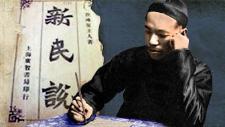Translating Modernity
Translating Modernity: The Migration of Western Ideas to China at the Turn of the 20th Century
 Dr Qing Cao studies how Western ideas of modernity were ‘translated' in China at the end of the 19th century and the beginning of the 20th century. The focus of his project is on the writings of one of the most influential cultural figures of the time, Liang Qichao (梁启超, 1873-1929), who promoted novel Western ideas of modernity through newspapers that he created for this very purpose. The project looks in particular at the language these newspapers use when introducing central concepts of modernity against the backdrop of critical reflections on China’s own traditions when Manchu China failed to meet the challenges posed by Western powers and the newly ‘modernised’ Japan. The hypothesis is that the conventional understanding of Liang Qichao as a ‘conservative’ fiercely opposed to the revolutionary overthrow of the last Manchu dynasty, led by Dr Sun Yat-Sen, is questionable.
Dr Qing Cao studies how Western ideas of modernity were ‘translated' in China at the end of the 19th century and the beginning of the 20th century. The focus of his project is on the writings of one of the most influential cultural figures of the time, Liang Qichao (梁启超, 1873-1929), who promoted novel Western ideas of modernity through newspapers that he created for this very purpose. The project looks in particular at the language these newspapers use when introducing central concepts of modernity against the backdrop of critical reflections on China’s own traditions when Manchu China failed to meet the challenges posed by Western powers and the newly ‘modernised’ Japan. The hypothesis is that the conventional understanding of Liang Qichao as a ‘conservative’ fiercely opposed to the revolutionary overthrow of the last Manchu dynasty, led by Dr Sun Yat-Sen, is questionable.
The main research question asked is how new concepts rooted in Western modernity are linguistically constructed and conveyed in elegant classical Chinese in the newly emergent press. Through his powerful portrayal of ‘Western learning’ (as well as his penetrating analysis of Chinese society through a largely Western lens), Liang Qichao created new vocabulary, images and categories, an entirely novel frame of reference and system of description, resulting in a new paradigm of looking at the world for Chinese speakers. This internal linguistic transformation of the Chinese worldview through Liang’s work was, arguably, more fundamental than the external institutional transformation of the Chinese polity led by Dr Sun Yat-Sen through the new Republic (1911-1949) which had never functioned well (the legacy of which is still lingering on).
Methodologically, this project examines the ‘domestication' of foreign ideas through the familiar linguistic form of classical Chinese, tracing the etymological roots of key terms both in the source (English) and target (Chinese) language. By focusing on the ‘grafting’ of foreign concepts with local language as a linguistic matrix of (new) mind-set moulding and ideological production, the project seeks to reveal the role that language plays in engineering a rapid shift in public opinion and worldview among China's literate population, which eventually swept away not only the last ruling Manchu family, but China’s age-old traditions as well.
Research includes a number of fieldtrips to China, especially visits to key collaborating institutions - Fudan University, Peking University, Zhejiang University and Shanghai Library - to collect material, present findings and forge further research networks.
[NB. This subproject contributes also to the consortium’s Translingual Strand, led from the Institute of Modern Languages Research (IMLR) at the School of Advanced Studies in London.]
For more information about this project contact: qing.cao@durham.ac.uk.


/prod01/prodbucket01/media/durham-university/research-/research-centres/open-world-research-initiative-owri/69559.jpg)